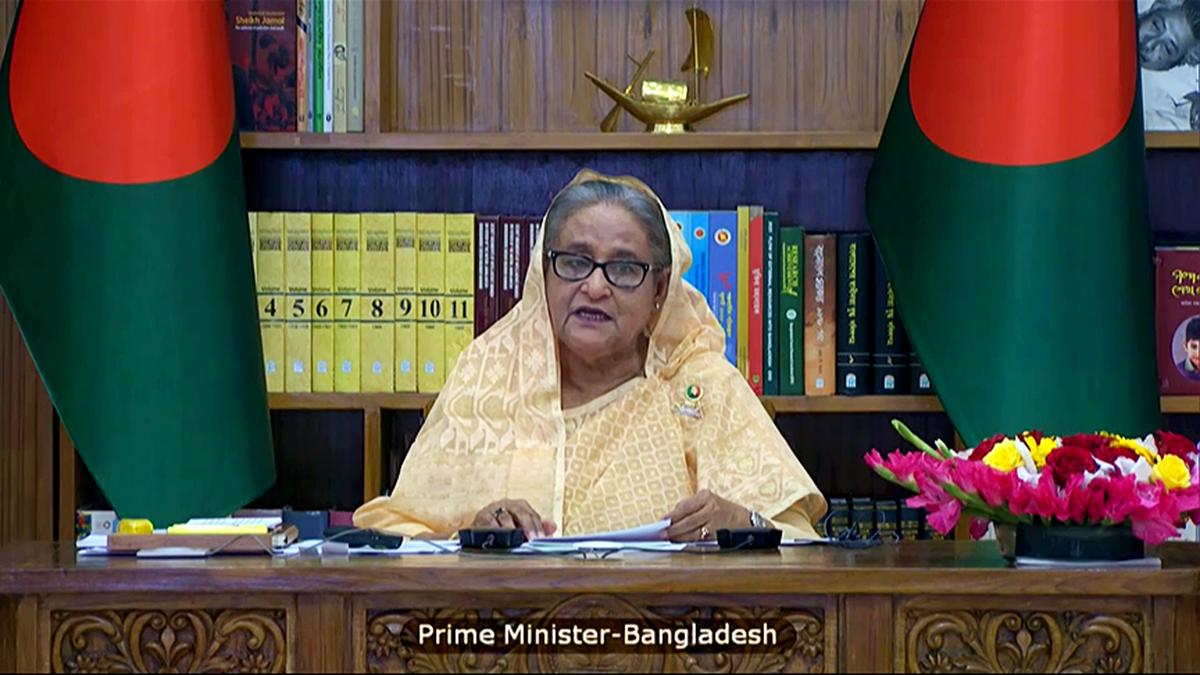
With upcoming three-nation tour, Sheikh Hasina balancing the big powers
The Hindu
With upcoming three-nation tour to Japan, the United States and the United Kingdom, Bangladesh Prime Minister Sheikh Hasina balancing the big powers
As Bangladesh Prime Minister Sheikh Hasina observed the religious traditions of the last day of Ramzan, Prime Minister Narendra Modi along with other world leaders sent her Id greetings. Mr. Modi said, “On behalf of the people of India, I convey my Id greetings to you and the people of Bangladesh”. But despite such gestures, there are signs that not everything is perfect in Bangladesh’s relation with major powers, including India. The coming fortnight-long visit by Ms. Hasina to Japan, the U.S. and the U.K. will give her an opportunity to size up challenges and opportunities facing her government. The broader diplomatic context for this fortnight-long visit has been shaping up over the past month when Ms. Hasina has been trying to balance her critics and friends. This was visible in the way she slammed the U.S. while also reaching out to it.
“It has the power to topple governments and Muslim countries in particular are facing a tough time. They are trying to eliminate democracy and introduce a government that will not have a democratic existence,” Ms. Hasina said in Parliament earlier this month. The outburst came in the backdrop of continuous criticism from various U.S. officials who have been building pressure on the Awami League government to hold a transparent election in Bangladesh. U.S. Ambassador Peter Haas hit the headlines last June when he met the Chief Election Commissioner of Bangladesh and pushed for a free and fair election. Earlier this year, Mr. Haas met families of several individuals who over the years were subjected to enforced disappearance, including the family of Sajedul Islam Sumon, when a delegation of the Awami League confronted him, triggering a security situation for the prominent diplomat.
The assertion of American red lines in Bangladesh is creating an impression that the U.S. is the most visible power in Bangladesh which has been known to be one of the closest partners of the Modi government in south Asia. Ms. Hasina, however, timed her criticism of the U.S. with an outreach as her Foreign Minister A.K. Abdul Momen visited Washington DC in the second week of April and met Secretary of State Antony Blinken. Mr. Blinken thanked Bangladesh for hosting the million-plus Rohingya refugees but reminded Dhaka about the need to stay on course of freedom of expression. The balancing of expression in the messages between Dhaka and the U.S. has come at a unique time when both Japan and China are also reaching out to Ms. Hasina.
On January 10, while flying to Africa for his first overseas visit, Beijing’s Foreign Minister Chin Gang stopped at Dhaka, which indicated the special importance of Dhaka in China’s regional plans. On March 19, Ms. Hasina inaugurated the first submarine base of Bangladesh at Pekua near Cox’s Bazar. The context for the upcoming Japan visit by Ms. Hasina was described by Prime Minister Fumio Kishida, who, during his visit to India last month, had talked about a Bay of Bengal industrial hub that could be connected to northeast India. This was further built upon by Japanese Ambassador to India Hiroshi Suzuki, who earlier this month visited Agartala and said Tripura could benefit if the deep sea port that Japan built in Chittagong’s Matarbari could be connected to the northeastern State which borders Chittagong. The Matarbari port will be fully operational in 2027 and the connectivity prospects for the northeastern region of India could thereby improve considerably if Tripura could be connected with the Matarbari port. The talk of the town in Dhaka is that the U.S. pressure on Bangladesh is because of the fact that Washington DC wants to establish a naval base in Bangladesh, but by working closely with Japan on the Matarbari project, Bangladesh appears to be indirectly catering to the Indo-Pacific project that is close to the American regional plans.
BNS Sheikh Hasina, the full-fledged submarine base of Bangladesh, is aimed at building Dhaka’s defence capacity, especially in view of its differences with Myanmar that has failed to control the Rohingya crisis and the Matarbari project can similarly transform the commercial and strategic prospects of Bangladesh by bringing it into the Indo-Pacific playground. Ms. Hasina has indicated that she will continue the balancing game by agreeing to make payment for Russia’s Rooppur nuclear power project in Chinese Yuan while also planning a celebration of Dhaka’s half century-long collaboration with the World Bank. In the coming fortnight, she will be in Washington DC for the event at the World Bank before landing in London for the coronation of King Charles III. This round will be followed by two more rounds of visits to France and to New Delhi for the G20 summit in June and September. Each of these visits are expected to portray the careful strategy of Ms. Hasina as she faces the election season.













